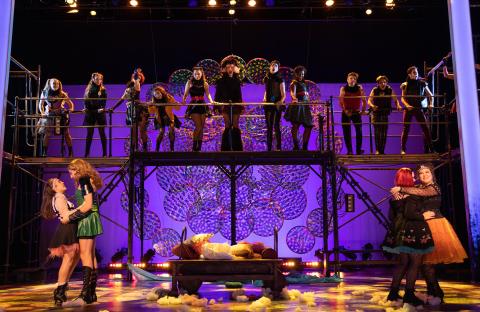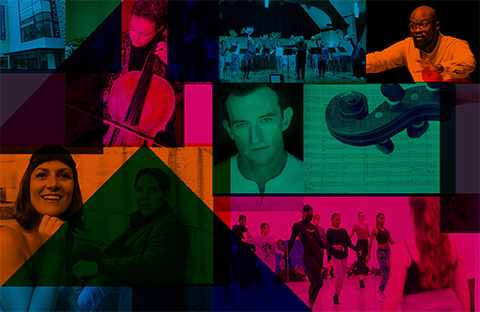Theater as a Mirror (and Driver) of Social Change

Theater has the capacity to reflect social change and to drive it—and never more so than in recent years, amid the #MeToo movement, the fall of Roe v. Wade, race-driven murders, and political insurrection. These forces have reshaped theater, both as an art form and as a workplace. Boston Conservatory’s Theater Division, too, is evolving with a changing industry and world.
Assistant Professor of Theater Angie Jepson is at the forefront of this reckoning. As an intimacy director, Jepson is an actors’ advocate, ensuring that performances honor both artistry and personal consent—principles that are sometimes in conflict. When is sexual intimacy gratuitous? When is violence necessary to further a plot?
“Across industries, you previously had actors feeling like they had to do whatever their director or costar thought was good in the moment without consent being a part of the process. And that’s harmful,” Jepson says. “We used to think it was fine, because that’s what you do for your craft; that’s what you do as an actor.”
But times have changed. She now teaches musical theater, movement, and stage combat courses that involve working closely with student directors. It’s an intense process in which older students grapple with scripts that incorporate violence or sexual imagery, often with younger peers in key roles.
Choreography is a big part of the work, because it becomes the physical script.
— Angie Jepson
Sensitive to power dynamics, Jepson guides students as they stage intimate or violent scenes, ensuring agreement on boundaries and protocols. “I work with students on consent, structure, and choreography. Choreography is a big part of the work, because it becomes the physical script,” she explains. “If you have choreography, everybody can agree to what’s happening. If we’re improvising movement, it’s hard for folks to consent.”
Jepson also mentors faculty members. She recently helped a dance instructor interact with a student who’d suffered past physical trauma, sharing ways to consent to touch. It’s an emotional but artistically gratifying process, she says. “When a student or an actor isn’t worried about whether they will be touched somewhere they don’t want to be touched—when that’s not even a concern—they’re free to fully dive into their work and give it everything that they have,” explains Jepson. “It’s really fun to see them be bold because they feel safe.”
As Jepson works to ensure that students can bring their authentic selves to the stage, her colleagues are navigating theater’s role as a mirror of the human experience. Angela M. Farr Schiller and Megan Stahl, both associate professors of theater, teach the course Evolutions and Revolutions in Musical Theater. Stahl also teaches Performing the Immigrant Experience.
Their students are pressed to consider classic musicals through a contemporary critical lens, weighing how musical theater—a hugely influential barometer of American culture (consider how many people can recite Hamilton by heart)—should both reflect society and challenge it.
For Schiller and Stahl, this work is deeply personal. Schiller recently edited The Methuen Drama Book of Trans Plays, which was a finalist in the 2022 Lambda Literary Awards for LGBTQ Anthology. Her syllabi contain at least one play by a trans playwright, which can be an eye-opening realization for students.
“We just read The Devils Between Us by Sharifa Yasmin. My students said they’d never read a play by a trans playwright, ever,” Schiller says.
Stahl, meanwhile, is deep in collaboration on an anthology of often overlooked plays by MENASA (Middle Eastern, North African, South Asian) female playwrights.
Musicals, both agree, are an ideal vehicle for examining and challenging the status quo: they’re iconic, influential, and uniquely American. While the Evolutions and Revolutions class used to focus on musical theater history, it was intentionally renamed for a broader perspective.
“The musical is really an American invention,” Stahl explains. “But, like a lot of homegrown American institutions, that means its structure is very white, very patriarchal, very heteronormative. And while the world has evolved in many ways, the musical has been a little slower.”
How can I actually use the work that I’m doing in the classroom to think about my art as a contribution to society and to the conversations that are being held in society?
— Megan Stahl
Recently, students in a capstone project were asked to design a summer theater festival in a neighborhood of their choice, such as Roxbury: What would they stage? Why? How could they bridge artists and community? “It’s not just about coming here to get trained and replicate that work out in the field. It’s about: How can I actually use the work that I’m doing in the classroom to think about my art as a contribution to society and to the conversations that are being held in society?” Stahl says.
For all three faculty members, authenticity and autonomy are essential. This, according to Schiller, is the future of theater.
“Students are rising up on college campuses across the nation, saying, ‘We want your intent and impact to be in alignment. We don’t want to just hear more about diversity, equity, and inclusion. We want to see that in our classrooms, in our coursework, in the shows that we’re selecting, and in the faculty members that we have,’” she says.
READ: STAGES 2022–2023

“Theater as a Mirror (and Driver) of Social Change” first appeared in the 2022–2023 issue of STAGES, Boston Conservatory's annual magazine.
